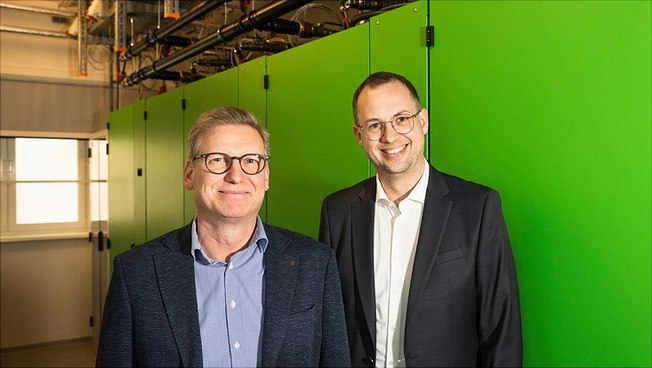3 December 2024
€4.4 million for a new high-performance computing systemHummel 2: New Calculating Power for Science

Photo: University of Hamburg/Esfandiari
Today, many research projects in all scientific disciplines at the University of Hamburg need to process such large quantities of data that high-performance computers are essential for calculation and analysis. Now University of Hamburg researchers can avail themselves of the new Hummel 2 system. The Hummel 2 replaces the previous Hummel, which was used successfully in research for over 9 years.
“We are very happy that we have been able to secure €4.4 million in follow-up funding from the German Research Foundation; the Hamburg Ministry of Science, Research, Equalities and Districts; and other sources,” explained Prof. Dr.-Ing Sebastian Gerling, the University of Hamburg’s chief digital officer.
The new calculating system is a high performance computing cluster (HPC Cluster) consisting of 178 computing nodes, each with 192 computing cores. There are also special applications, for example, AI with 32 especially fast GPGPU cores. The scientific treasure, however, lies in the data generated, for which 2 large hard disk drives are integrated into the cluster. There are 5.2 petabytes of storage and a further 500 terabytes based on SSD/NVMe. Computing nodes and hard disk systems are connected via a fast network.
A special challenge facing such large computing systems is cooling. All CPUs and GPUs, as well as the storage, are directly cooled with water. “In the future, it should be possible to use about two-thirds of the computer’s thermal discharge by removing the cooling water, which corresponds to a savings of about 10 to 20 percent of CO₂,” explains Gerling. This, he continues, is an important contribution to the University’s twin transformation, which links digitalization and sustainability.
----
Do you need photos for reports about the University of Hamburg? You can find high-resolution press photos in print quality for free in our image database.
Are you looking for an expert for an article on a particular topic? The University’s experts service offers a search by department and key word which you can use to get contact details.
